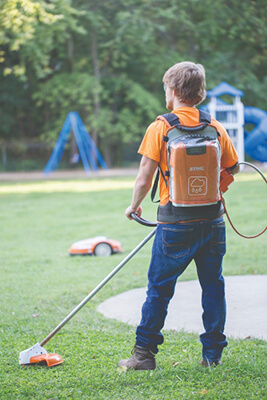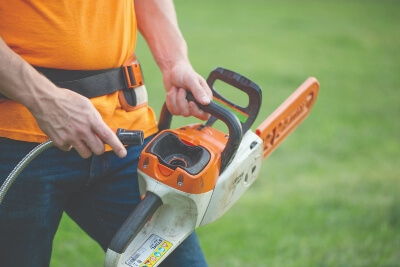Ever wonder what the landscaping industry is going to look like in the future? Well thanks to Zack Kline, you don’t have to. The 30-year-old owner of A.I.R. (Atmosphere Improvement and Renewal) in Rockville, Maryland, is years ahead of many of his counterparts in the green industry.
It’s not just the ultramodern way of instantly communicating with customers through his website and Facebook, it’s also the sustainable products he is applying to lawns and the environmentally friendly equipment he is using to keep them maintained.
It is a menu of services that might not be for every property owner, but for those who want to know their lawns are being maintained in the most environmentally conscious way possible, A.I.R. has the solution.
People are starting to pay more attention to the chemicals that are being put on their lawns thanks to lawsuits that are all over the news. It’s only fueling the interest in natural, organic lawn care services. Environmentally conscious millennials are homeowners now, and they’re hiring lawn care professionals. Kline wants A.I.R. to be the answer to those types of people who are concerned with the impact their lawn care has on the environment.
 Kline likens his lawn care business to Whole Foods of the grocery store chains. The tomato you buy at Whole Foods might cost three times as much as a regular grocery store, but the difference is what goes into the process.
Kline likens his lawn care business to Whole Foods of the grocery store chains. The tomato you buy at Whole Foods might cost three times as much as a regular grocery store, but the difference is what goes into the process.
He describes his customers as the type of people you might just bump into at Whole Foods. “They’re very educated. They realize the effort that goes into our services, and they are willing to pay a little bit more for that.”
Many of the natural, organic lawn care customers either have children or pets, and they are concerned about exposing them to chemicals. On the battery-powered equipment service, Kline says, “The nice thing is that when they are using our service they don’t have to worry about us interrupting their day. If it’s a nice day and the windows are open, we don’t have to worry about the gasoline fumes blowing into their house.”
A.I.R. has begun deploying robotic mowers for some clients. With the robot mower technology, the mowers cut all day, all night, rain or shine “and you can’t even hear them,” says Kline.
Converting customers
It sometimes can be challenging selling a client on these pricier but better-for-the-atmosphere services, especially in markets where landscaping is competitive. That’s where education comes in.
Kline says, “You can look at two lawns and they can both look the same, but one could be treated with organic products and the other could be treated with chemicals. Without proper signage and the customer sharing that information, it sometimes can be hard to distinguish between the two.”
He’s optimistic that natural, organic lawn care and battery-powered equipment will become ubiquitous in the green industry just like Whole Foods and Trader Joe’s did in theirs.
“Ten to 15 years ago, those stores weren’t nearly as prolific as they are today,” he says. “It took education to show consumers it was a service that could be done and then growing it from there, which is my hope with A.I.R.”
Getting started
The idea for A.I.R. was a long time in the making. Kline remembers cutting the grass in the family yard as early as sixth grade and enjoying every minute of it. In high school and in college he worked summers for a small landscaping company.
It was during one of these summer stints when he had his eureka moment. He was trimming a 2.5-acre property and was frustrated by the loud noise coming from the string trimmer. He also knew how much gasoline the company was putting into its equipment on a daily basis. “There has to be a better way,” Kline thought. “That set me on the path of looking at battery-powered products: trimmers, blowers and mowers.”
He was studying marketing and information systems at Salisbury University at the time. “My initial knowledge of the industry came through work experience,” he says.
Kline developed a business plan and entered Salisbury University’s Bernstein Business Plan Competition in 2010, earning honorable mention. He honed his plan and came back the following year, winning the $5,000 first-place prize. In 2011, he used the money to start the company, putting a down payment on a truck and purchasing battery-powered lawn equipment.
While he was exploring what equipment to buy, he discovered Stihl’s battery products. According to Kline, they were the best on the market, but being a broke college student, he didn’t have the budget to purchase the equipment. But he didn’t just give up. He decided to get a little creative. He found out Stihl’s president at the time, Fred Whyte, was an avid bagpipe player.
“I bought him a pair of bagpipe cufflinks and wrote him a handwritten letter explaining my vision for the company and how I could really help them grow their battery-powered products through my exposure,” says Kline.
That gesture paid off. “Sure enough, I got a call from him a week after the letter and cufflinks went out thanking me for the gift and inviting me to meet one of their executives, Roger Phelps,” he says.
He met with Phelps and after proving that he “wasn’t some crazy person and I was setting out to do what I said I was going to do, they ended up donating some equipment.”
 Stihl also connected him with the National Association of Landscape Professionals and “really just set my career off to a fast start in terms of exposure and being able to meet some of the brightest and top minds in the industry,” Kline says.
Stihl also connected him with the National Association of Landscape Professionals and “really just set my career off to a fast start in terms of exposure and being able to meet some of the brightest and top minds in the industry,” Kline says.
As he was working on client properties, he began asking if they would consider doing other sustainable landscape services such as natural, organic lawn care.
To learn about this type of lawn care, he reached out to an expert in the field, Paul Tukey. He is an authority on the subject. He wrote the Organic Lawn Care Manual and starred in the documentary “A Chemical Reaction,” which covers the story of the first town in North America to ban pesticides. Currently he is the chief sustainability officer for Glenstone, a contemporary art museum in Potomac, Maryland, which has nearly 300 acres of natural, organic landscapes. The two struck a friendship and Tukey taught him what he knew.
“He mentored me and trained me in the methodology, approach and the need for natural, organic lawn care, and that really helped boost my expertise in that, as well as help me earn some key clients and credibility,” says Kline.
The first few years, A.I.R. was a side business for Kline. It wasn’t until around 2014 that Kline decided to work on the business full time, and he has been ever since.
Pushing forward
Battery-powered and natural, organic lawn care are certainly sustainable practices, but Kline isn’t content stopping there.
“The big thing I am really starting to push, and I see this as a game-changer in terms of managing lawns in the most sustainable way possible, is robotic mowers,” he says.
In 2019, Kline began winding down his conventional mowing business and not taking on more new clients for that service. Now he is only selling robot mowing. “The client purchases the unit from a local dealer. We do the install and maintenance on it, and if they wanted string trimming and edging on the property we would do it on an as-needed basis.”
 He’s certain robotic mowing is going to be “the next huge thing.” It is already huge in Europe and Kline says that between unpredictable weather, the labor shortage in the green industry and the growth of sustainability, it is going to become more mainstream.
He’s certain robotic mowing is going to be “the next huge thing.” It is already huge in Europe and Kline says that between unpredictable weather, the labor shortage in the green industry and the growth of sustainability, it is going to become more mainstream.
“I just always like to be ahead of the curve and that is where I see it going,” he says.
He is fine with business being a little slower for the robotic mowing clients. “It’s given us some time to learn everything about the robot mowers.”
A.I.R. is primarily targeting residential customers because Kline says there aren’t as many layers to go through to sell someone on the idea. The homeowner is the decision-maker.
He is also trying out new ways to communicate using his website and social media, so he’ll be ready when those expected floodgates open. Kline describes what he is developing as an Uber-like model where customers can go to order lawn care services and local contractors, stay-at-home parents, vets, students and other community members can sign up for work.
He’d like to see A.I.R. grow to a $1 million business in the next three to five years and eventually expand the model to other parts of the country.
A way of life
Kline considers himself an environmentalist and the more he digs in, the more “it just snowballs,” in his words. He became a vegan a year and a half ago in part because of the environment, but also for health.
“I am a big believer that a lot of the things that we do in our daily lives, like running gasoline- powered lawn equipment, contributes to the problem of climate change,” he says.
At the same time, Kline also embraces innovation, which he describes as “keeping an open mind, trying new things and looking for new things.”
He likes the triple bottom line approach to business that emphasizes people, planet and profit. “A lot of companies have demonstrated that works,” he says.
Getting other landscaping companies to embrace environmentally friendly approaches is another goal of Kline’s. He hears from many of his competitors that customers aren’t interested in it.
“I want to show them that you can do it and that people do want it,” he says, but it is an uphill battle.
When Montgomery County, Maryland, passed legislation to ban cosmetic pesticides on all public and private lands in 2015, it was met with some opposition.
It led to a lawsuit being filed claiming the jurisdiction had overstepped its authority.
“I was the only landscaper in the county that testified in support of it,” recalls Kline.
While a Montgomery County Circuit Court judge ruled in 2017 the county’s ban was preempted by state law, a decision by the Court of Special Appeals in May overturned the ruling. The law is expected to take effect.
“I’d love to see more legislation like that come across different communities because I think a lot of changes are going to have to happen through policy and social change,” he says.
To those folks, he says it is time to realize that environmentally friendly lawn care is what people want “and if you did it, it would be better for you, the community you’re in and the whole environment that we all live in.”
Kline might just be on to something. Only time will tell.
This column originally appeared in Irrigation & Green Industry magazine.
Kristin Ely is an award-winning writer who specializes in industry reporting for business publications and can be reached at kristinsmithely@gmail.com.


 Kline likens his lawn care business to Whole Foods of the grocery store chains. The tomato you buy at Whole Foods might cost three times as much as a regular grocery store, but the difference is what goes into the process.
Kline likens his lawn care business to Whole Foods of the grocery store chains. The tomato you buy at Whole Foods might cost three times as much as a regular grocery store, but the difference is what goes into the process. Stihl also connected him with the National Association of Landscape Professionals and “really just set my career off to a fast start in terms of exposure and being able to meet some of the brightest and top minds in the industry,” Kline says.
Stihl also connected him with the National Association of Landscape Professionals and “really just set my career off to a fast start in terms of exposure and being able to meet some of the brightest and top minds in the industry,” Kline says. He’s certain robotic mowing is going to be “the next huge thing.” It is already huge in Europe and Kline says that between unpredictable weather, the labor shortage in the green industry and the growth of sustainability, it is going to become more mainstream.
He’s certain robotic mowing is going to be “the next huge thing.” It is already huge in Europe and Kline says that between unpredictable weather, the labor shortage in the green industry and the growth of sustainability, it is going to become more mainstream.


